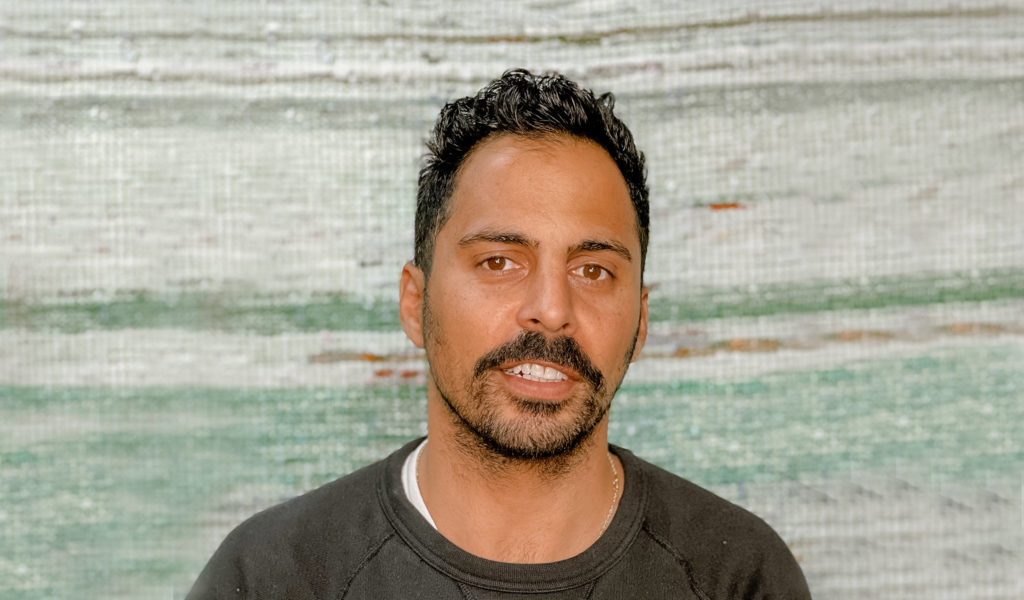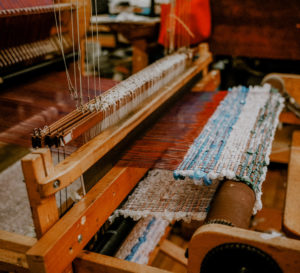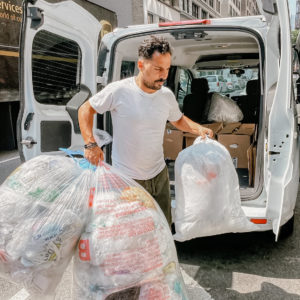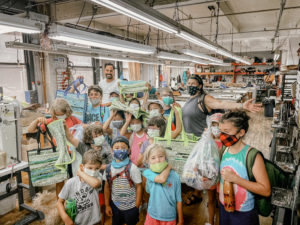Alex Dabagh is the Founder and Creator of ANYBAG, the bag on a mission to reimagine waste. ANYBAG was founded in 2019 with the goal to keep single-use plastic bags out of our waterways and landfills. Since its inception, over 8,000 lbs. of plastic has been collected to create durable and reusable bags. Alex plans to expand ANYBAG into new markets and help lead other cities in tackling their plastic waste problem.
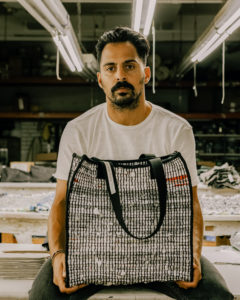 Tell us about your background and what inspired you to start ANYBAG?
Tell us about your background and what inspired you to start ANYBAG?
I’m a second-generation leather smith, a trade I learned growing up in my family’s leather goods factory in NYC. In 2009, we expanded the business adding woven leather to our product list, and I found myself constantly experimenting with scraps and leftovers to create new things. I loved creating new textiles from waste, never thinking I was doing anything sustainable just using scraps to be creative. Fast forward to now, I realized sustainability was always in our DNA. It’s the responsibility of us designers and manufacturers to come up with creative solutions to the world’s most pressing issues. Taking my recycling out one night I began to think about where it was all headed, and more so, and where is all of New York City’s 8.5 million residents recycling going?
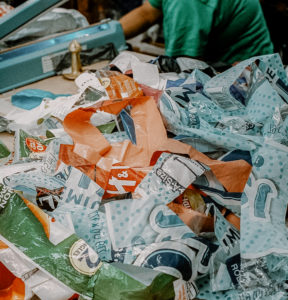
Source: facebook.com
Where do you obtain the plastic to create the ANYBAG currently?
At first, all of the plastic I collected was from items and textiles that came through the factory. I would save all the film wrappers, poly bags, and plastic bags that I would encounter. Then, I started to reach out to friends and family to collect their soft plastic bags and films. I reached out to my local supermarket and began taking all their unwanted plastic bags. Since then, I have partnered with elementary schools by placing donation bins in the school buildings and getting the kids involved. We have partnered with Groundcycle, a compost collection company, who now added soft plastic collection from their customers and drops them off to ANYBAG twice a month. We have also partnered with retail stores and packaging company’s collecting all their poly bags and package mailers.
What does the process look like to create these bags from start to finish?
The real star of the ANYBAG is the woven plastic textile. First, we begin by collecting the plastic, sorting, and separating it by density and size. We then apply a disinfectant. After that, we begin to heat seal all the ends of the plastic together, making one long continuous sheet of plastic, which we then cut into strips varying from 1” to 3” widths making something similar to yarn or thread, but plastic. While this is being done we prep the weaving loom by warping it with cotton thread. Once the loom is ready and the plastic is cut, we hand weave the plastic with the cotton cord creating a one of kind textile. This textile is then cut and sewn into the ANYBAG.
How much plastic have you kept out of the landfill to date since you started the company?
In the past year alone ANYBAG has collected and diverted over 9000 lbs of plastic from reaching our landfills and waterways.
What impact do these bags have on our environment and the people that use them every day?
With each ANYBAG, 95 single use plastic bags are diverted from reaching our landfills and waterways further polluting our environment.
What’s next for ANYBAG? Any plans to expand the product line or to create bags made from plastic waste generated from other cities?
We are currently adding new shapes to the collection, including the Mini and a Weekender, and also new items like baskets and home items. However, the ultimate goal is to open ANYBAG hubs in other cities creating a circular economy by creating jobs, educating the public, raising awareness, and ultimately eliminating that city’s carbon footprint by upcycling all their plastic waste. Obviously, it’s up to governments and corporations to limit the production of these items, but that seems far away. We want to close the loop on plastic once and for all and keep it out of the landfills.
How has state legislation helped to really bring your product to life? Will legislation from other cities or states drive expansion?
We’re doing the city of New York a favor by keeping plastic out of their recycling centers, because soft plastic can’t be recycled and only causes problems once it is received. ANYBAG hasn’t received any governmental support, but the exposure and visibility would allow us to regenerate more plastic waste into textile and goods. In the meantime, we partner with brands and corporations to take their plastic waste and generate it into a branded product as a pledge to their commitment to the environment going forward.
Can you tell us how you are engaging with the local community and educating New Yorkers about our plastic waste problem?
One thing I am always vocal about is that everything we do is a step in the right direction, no matter how large or small. We shouldn’t let perfection get in the way of progress. The more people that understand the issue, the more we can collectively speak up for change. We work with sidewalk and beach cleanup organizations within the community. We have classes and groups come into the factory to see firsthand how and what we do. We also have virtual show and tells with groups, schools, and businesses that want to learn about the ANYBAG and how to be better New Yorkers. Education is the first step.
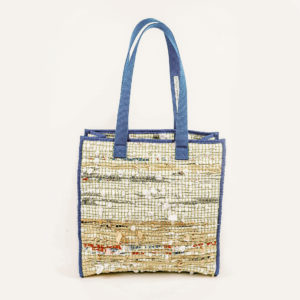
Source: facebook.com
What is your advice for consumers looking to reduce their plastic consumption?
My advice is to slow down enough to pay attention to the choices we are making as consumers. Know what and who you are purchasing from. And most importantly refuse plastic if and when possible. The easiest step is to bring your own bag.
Subscribe to rts.com today to learn about more innovative companies or chat with one of our TRUE Advisors for information on how to take your business zero waste.

